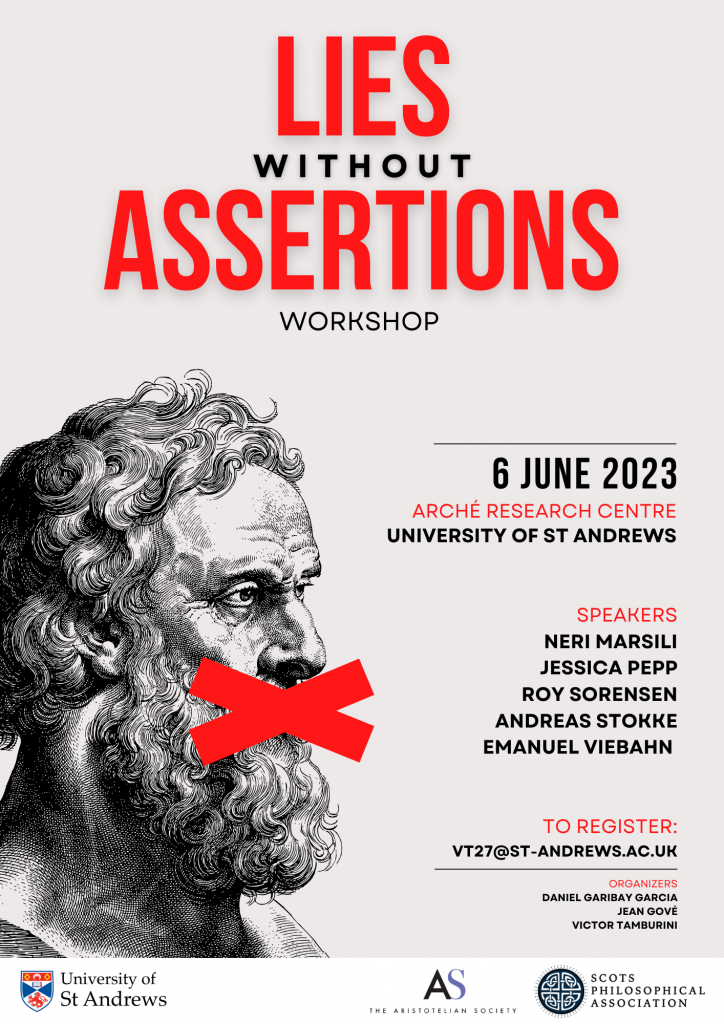
- This event has passed.
Lies without Assertions Workshop
6th June 2023
Event Navigation
Lying requires that a person makes a statement, but does it require assertion? This last thesis has been recently challenged. It has been argued that speakers can lie with presuppositions (Viebahn 2019), promises (Marsili 2016), and arguments (Sorensen 2017). Questioning the relation between lies and assertion raises further questions: should we capture in one theoretical category all and only cases we pre-theoretically call ‘lies’? How should we draw the distinction between lying and other kinds of deception such as misleading? What can the nature of lying tell us about the relation between assertion and other speech acts?
If you wish to attend (either in person or online), please register by sending an email at vt27@st-andrews.ac.uk.
(Abstracts and Schedule below.)
The workshop will be held in the Arts Building, Room 115
Speakers:
• Roy Sorensen (University of Texas at Austin/University of St Andrews)
• Andreas Stokke (Uppsala University)
• Jessica Pepp (Uppsala University)
• Neri Marsili (University of Barcelona)
• Emanuel Viebahn (Humboldt-Universität/Freie Universität, Berlin)

Schedule
Commitments and Lies, With or Without Assertion – Jessica Pepp
Lying and assertion seem to be closely connected. Many philosophers have agreed (details aside) that to lie is to assert something one takes to be false (or, at least, not true). What, then, to make of cases in which someone seems to lie without asserting anything they believe to be false/untrue? For instance, what should one say about cases in which people seem to lie about something by presupposing it, or by implying it? Three options are immediately on the table, for any given case of putative lying without assertion: (i) reject the judgment that it is a case of lying (perhaps arguing that it is instead a case of misleading), (ii) reject the judgment that the content of the lie is not asserted, (iii) revise the definition of lying so as not to require the content of a lie to be asserted. A fourth option is to accept the judgment that the case is a case of lying and to become (somewhat) quiet about assertion. One can then define lying without appealing to the notion of assertion, by incorporating elements from accounts of assertion in such a way that the putatively non-assertive lie falls under the definition. If the resultant definition of lying proves robust, it is then a further question what this should tell us about the nature of assertion.
The paper-in-progress on which this talk is based is a collaboration between one author who has pursued the fourth strategy just mentioned, drawing on so-called “commitment accounts” of assertion (Viebahn 2021) and one author who is favourable to the strategy but critical of the specifics of Viebahn’s approach (Pepp 2022). We aim to pursue the strategy further by addressing two related questions. First, what is the nature of the commitment that partly constitutes lying and sets it apart from misleading—what does it mean, in this context, to commit oneself to something’s being the case? Second, what are the grounds of that commitment—what makes it the case that someone has taken on such a commitment?
In this talk, I suggest that the relevant commitment is a commitment to accept certain attributions of belief to oneself. I argue against proposals on which this commitment is grounded in epistemic factors, such as how sure a hearer can be of what one has communicated. I explore an alternative proposal on which the commitment is grounded in expectations that partly constitute speakers’ participation in the joint activity of having a conversation.
Speaking for Someone Else: Group Lies and Self-Less Assertions – Andreas Stokke
This talk compares cases of so-called “selfless assertions” with lies told by groups such as corporations or political parties. I argue that there are differences, even though both involve speakers making assertions on behalf of someone else. I draw some conclusions concerning how to understand the involvement of the speaker’s attitudes in such cases.
Telling stories, telling lies – Emanuel Viebahn
It is widely held that authors cannot lie in producing works of fiction: either you tell a story, or you tell a lie. The first aim of this talk is to challenge this consensus. I will point to various cases in which authors should count as lying in telling stories. The second aim of the talk is to explore whether this suggests that it is possible to lie without asserting.
Fichte’s World of Wordless Lies – Roy Sorensen
Immanuel Kant was a moderate about lying! True, he enlists among the battalion of never-liars. But Kant cushions `Never lie’ with a flexible weave of old and new distinctions. The true extremist about lying is Kant’s first German interpreter. Johann Gottlieb Fichte (1762 – 1814) disintegrates the distinctions designed to make `Never lie’ practical: lying/misleading, discursive/pictorial representation, commission/omission, honesty/candor. Whereas Kant restricts lies to declarations (assertions and promises), Fichte counts the failure to correct an error as a lie. Contrary to Kant, we all have a duty to perfect each other. We must prevent and correct error because false belief undermines free action. Any intentional deception, verbal or non-verbal, is therefore a lie. By Fichte’s reckoning, Kant lied by wearing a wig. Kant overcame the temptation to save an innocent man from murder by lying. Fichte is mortified. Even to have considered lying was one thought too many!
Lying: some insights from speech act theory – Neri Marsili
This talk revisits some traditional questions in the philosophy of lying through the lens of speech act theory – including whether lying always involves an attempt to deceive, whether it is possible to lie without making an assertion, and whether making a believed-true statement can constitute lying. The emerging picture offers a fresh perspective on the nature of lying, shining new light on long-standing philosophical debates.
